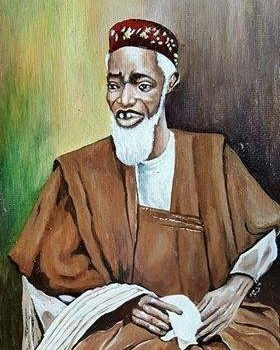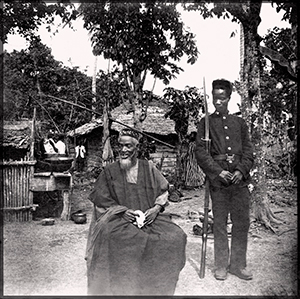Meet Bai Bureh, known also by his nickname Kebalai, “one who never tires of war,” who fanned the flames of Sierra Leone’s fight for independence from British rule. Having only spears swords, slings and obsolete muskets, Bureh and his men were a thorn in the side of the British administration that was using Sierra Leone’s natural harbor Freetown as its capital. They were able to hold off a highly trained and well equipped British force in 1898 for many months through guerrilla warfare.

Bureh was born in 1840 to an important Loko war chief, and a Temne woman from the region around modern Makeni. While he was still young, Bureh was sent to training school for warriors in Northern Sierra Leone. He came out as a strong soldier and ruled Kassel, a village near Port Loko where he was born. A military strategist and Muslim devout, he set out to establish what he viewed as correct Islamic and indigenous practices throughout Northern Sierra Leone. He fought against neighboring villages and rulers who were not in support of his plan, and won many of these wars earning acclaim. The people of the north strongly believed they had found the best warrior who could defend them and their land and crowned Bureh chief of Northern Sierra Leone in 1886 when he was 46 years old.
As a ruler he refused to work with the British administration that was based in the capital Freetown. He demonstrated his defiance of British colonial rule with a raid on British troops across the border into French Guinea, and he refused to recognize a peace treaty the British had negotiated with the Limba people in the north without his participation.

The final straw came in the form of the “hut tax” the British imposed in 1893, demanding that Sierra Leoneans pay taxes for the right to live in their own land. In order to afford this tax, many had to begin working as laborers. Bureh, however never acknowledged the “hut tax” arguing that Sierra Leoneans should be left alone to take care of their affairs. The British quickly responded by issuing a warrant for Bureh’s arrest, offering a 100 pound reward for his capture. However no one would come forward with information. A colonial official wrote that Bureh’s men “loved their chief, and remained loyal to him to the very last.” Bureh in turn shrewdly responded by offering an astonishing 500 pound reward for the capture of the governor.
When the British were unable to a capture him, it triggered a war of aggression on which Bureh responded with a large scale guerrilla revolt that is also known as the 1898 Hut Tax war, which lasted for ten months. Bureh declared war on the British and gathered warriors from the Temne group in the Northern Province, as well as from the Soso, Loko, and Limba villages under his command. On the surface, declaring war against the elite forces of the British seemed suicidal. However, even though his fighters had little formal training, they successfully fought off the most highly trained and disciplined British forces for months, killing many of them. Their expert knowledge of the terrain where the war took place aided their success. Bureh’s forces repeatedly surprised British troops making them subject to grueling fire from behind hidden war fences before slipping away unseen into the bush. Bureh understood the value of military tactics such as cutting off supply lines. During this time he also gained a reputation for supernatural power and was believed to be bullet-proof and have the ability to become invisible or stay for long periods of time under water.
British forces were unable to defeat Bureh and his men until November 11, 1898, when he was finally captured and taken under guard to Freetown. The British had hung nearly 100 of his fighters but had spared his life. Nevertheless he had earned the respect of his enemies for his fighting skills and for his compassion toward civilians. His fellow countrymen flocked the quarters he was being kept at nearly everyday to catch a glimpse of the man they considered to be a hero.
Eventually, the British sent Bureh in exile to the Gold Coast (present day Ghana) but brought him back in 1905 and then reinstated him as the chief of Kassel before his death in 1908. Sierra Leone eventually because an independent state in 1961, and many credit Bai Bureh for initiating the fight for independence. Today, a large statue of Bai Bureh resides in central Freetown and is pictured on several Sierra Leonean paper bills. His grave is also a national heritage site, declared a National Monument by the Ministry of Tourism and Cultural Affairs. His foundational role in ushering the freedom of Sierra Leone is not to be forgotten.
Powered by WPeMatico


